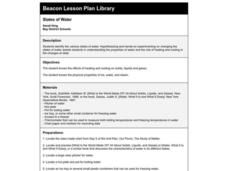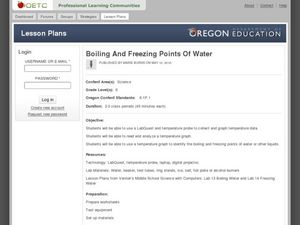Curated OER
STATES OF WATER
Students identify the various states of water. They use hypothesizing and hands-on experimenting on changing the states of water, the properties of water, and the role of heating and cooling in the changes of state.
Foundation for Water & Energy Education
What is the Water Cycle? Activity A
Hydrologists create a concept map about how water is used and a sentence strip defining water and describing its unique properties. Small groups work together to fill a small milk carton and compute the mass of water inside. The next...
Curated OER
Physical Changes of Water
Students observe changes in water. In this instructional activity about water and its forms, students perform an experiment to determine how water changes. Students analyze what causes water to be solid, liquid, or gas. Students record...
Center for Learning in Action
Introducing Physical and Chemical Changes
Young scientists investigate chemical and physical changes to the states of matter—gas, liquid, and solid—as well as solutions and suspensions with a variety of demonstrations, grand conversation, and an interactive quiz to check for...
Curated OER
Water Alchemy
After reading "Aquatic Alchemy," an article about recapturing water for reuse when in space, your class will use calcium hydroxide or hydrated lime to purify cloudy water. Geared toward high school chemistry or environmental science...
Curated OER
Physical Changes and the Water Cycle - Three
Third graders observe and reproduce the water cycle in their very own classroom. A simple, yet very effective, demonstration on how water evaporates is observed by the young scientists. They make observations and sketches in their...
Curated OER
Earth's Ecology
Students investigate the three states of water. In this physical science instructional activity, students watch the video "Earth's Ecology" and observe water in its' three states. Students record observations.
Center for Learning in Action
Introduction to the States of Matter
Liquids, gases, and solids are the states of matter in which scholars investigate in a lesson plan that offers in-depth information and engaging activities that look into the three states and the changes their properties make when mixed...
Curated OER
Properties of Water
Students study the three physical properties of water-solid, liquid and gas. They classify materials as solids, liquids, and gases. They define the terms solids, liquids and matter and explain that when materials are manipulated,...
Curated OER
Physical Changes and States of Matter
Fourth graders identify a physical change as one that results in a change in size, shape, or state of matter. After an initial teacher-led discussion and demonstration, groups of students get together to perform an experiment which...
Curated OER
Geography: Physical Features
Physical features in our geography are outlined in this colorful PowerPoint. First, different physical features are listed. Then, they are defined with a corresponding graphic. Tip: While presenting this slideshow to your class, ask them...
Curated OER
Physical And Chemical Changes
In this physical and chemical change instructional activity, students solve 13 clues in a crossword puzzle focusing on rates of chemical reactions and changes in the state of matter.
Micron Technology Foundation
States of Matter
Solids, liquids, gasses oh my! Young scientists will be amazed when they try this experiment, which uses dry ice to discover the states of matter through sublimation.
Virginia Department of Education
Physical and Chemical Properties of Water
How can you effectively provide detailed concepts of water properties to your high school class in a way they find exciting and challenging at the same time? By letting them play, of course! Through a variety of experiments, pupils...
Curated OER
Boiling and Freezing Points of Water
Challenge your sixth graders with this lesson about the freezing and boiling points of water. In these activities learners graph temperature data, read and analyze information, and identify the freezing and boiling points of water and...
Baylor College
How Can We Find Out What Is in Water?
Using paper chromatography, water watchers discover that several substances might be dissolved even though they aren't visible. For this case, you will prepare a mixture of three different food colorings for them to experiment with. A...
University of Waikato
Solid to Liquid to Gas
Help classes understand heat as a form of energy. A hands-on activity has learners investigate how heat, or the lack of heat, affects the physical state of water. They then connect their discoveries to the water cycle.
Curated OER
Water and Ice
Young scholars participate in various air experiments to understand that air is all around us. In this states of matter lesson plan, students focus on the role of air in the water cycle. Young scholars understand that air is densest near...
Curated OER
Physical Changes Pre-Quiz
Quiz the class on what they know before you teach it. This assessment will give you an idea of what basic scientific concepts are known to your learners. Physical change, state of matter, and basic plant and animal needs are covered.
Curated OER
Boat Safety and Water Sports, Lesson 2: Personal Flotation Devices
Lesson 2 is part of a twenty-two lesson unit on boat safety and water sports. The focus in this lesson is on personal flotation devices. There are reasons why the law requires PFDs. Click on the resource link at the bottom of the page to...
Curated OER
Physical and Chemical Reactions - Factors Which Affect Reaction Rate
A total of five experiments lead chemistry pros to understand the difference between physical and chemical change. They also experiment with exothermic reaction factors that affect rate of reaction. The procedures are not written in the...
Curated OER
States of Matter
Students study the states of matter. In this matter lesson, students use dry ice to study the states of matter. Students observe and answer questions based on the material.
Centers for Ocean Sciences
Ocean and Great Lakes Literacy: Principle 1
Is your current lesson plan for salt and freshwater literacy leaving you high and dry? If so, dive into part one of a seven-part series that explores the physical features of Earth's salt and freshwater sources. Junior hydrologists...
Curated OER
Physical Changes and States of Matter
Fourth graders study evaporation and condensation as parts of the water cycle. First they determine the similarities and differences between a cup of water and an ice cube before measuring the volume of ice before melting it, and...

























